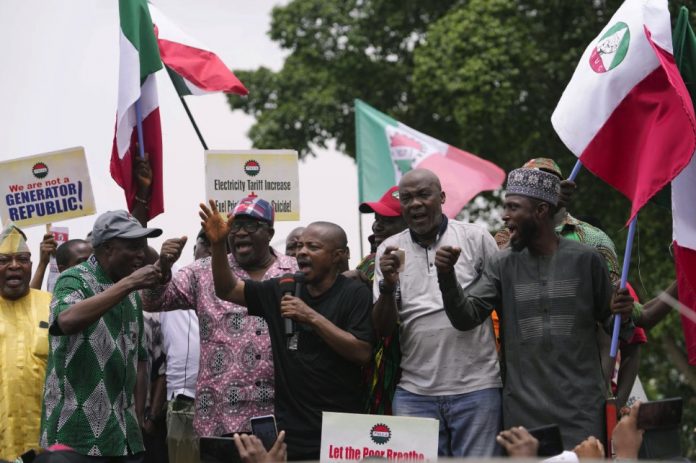การประท้วงทั่วประเทศในไนจีเรียทำให้การเดินทางทางอากาศหยุดชะงัก และส่งผลให้ไฟฟ้าดับเมื่อวันจันทร์ เนื่องจากคนงานสหภาพแรงงานบังคับปิดโครงข่ายไฟฟ้าของประเทศ ตามรายงานของบริษัท Transmission Company of Nigeria (TCN) ผู้คนหลายสิบล้านคนไม่มีไฟฟ้าใช้ และเที่ยวบินหยุดชะงักเนื่องจากการนัดหยุดงานอย่างไม่มีกำหนดโดยสภาแรงงานไนจีเรีย Nigerian Labour Congress (NLC) และสภาสหภาพแรงงาน Trade Union Congress (TUC) เจ้าหน้าที่ปฏิบัติการถูกทำร้ายและได้รับบาดเจ็บระหว่างการปิดโรงงาน โดยมีภาพที่เผยแพร่บนโซเชียลมีเดียซึ่งแสดงให้เห็นคนงานสหภาพแรงงานที่ถือไม้เท้าไล่พนักงานออกจากสถานที่ราชการ การประท้วงดังกล่าวเกิดขึ้นหลังจากการเจรจาล้มเหลวเรื่องการปรับขึ้นค่าแรงขั้นต่ำของรัฐบาลกลาง และการประท้วงต่อต้านการปรับขึ้นอัตราค่าไฟฟ้า แม้ว่ารัฐบาลจะเสนอให้ขึ้นค่าจ้าง 100% เป็น 60,000 ไนรา (44.89 ดอลลาร์; 1,641.40 บาทไทย) แต่สหภาพแรงงานก็เรียกร้องให้เพิ่มค่าจ้าง 1,547% เป็น 494,000 ไนรา (369.6 ดอลลาร์; 13,516.27 บาทไทย)
การประท้วงดังกล่าวส่งผลให้การเดินทางหยุดชะงักเป็นวงกว้าง โดยผู้โดยสารติดอยู่ที่สนามบินหลักในลากอสและอาบูจา เนื่องจากเที่ยวบินทั้งหมดถูกระงับ บริการด้านการดูแลสุขภาพก็ได้รับผลกระทบอย่างรุนแรงเช่นกัน โดยโรงพยาบาลไม่สามารถจ่ายไฟให้กับอุปกรณ์สำคัญได้เนื่องจากการปิดโครงข่ายไฟฟ้า Lateef Fagbemi รัฐมนตรีกระทรวงยุติธรรมไนจีเรีย ประกาศว่าการนัดหยุดงานประท้วงดังกล่าวผิดกฎหมาย โดยระบุว่าเป็นการ “เกิดก่อนกำหนดและไม่มีประสิทธิผล” อย่างไรก็ตาม ความคิดเห็นเกี่ยวกับโซเชียลมีเดียถูกแบ่งแยก โดยบางส่วนสนับสนุนการนัดหยุดงานเพื่อขอค่าจ้างที่สูงขึ้น ขณะที่คนอื่นๆ วิพากษ์วิจารณ์ผลกระทบต่อประชาชน “ฉันสนับสนุนการนัดหยุดงานของ NLC” ทนายความ เฟสตัส โอกุน เขียน โดยอ้างถึงค่าแรงขั้นต่ำที่ไม่ยั่งยืน ในทางกลับกัน ที่ปรึกษาด้านการจัดการ Dipo Awojide แย้งว่าโครงสร้างพื้นฐานที่สำคัญไม่ควรถูกรบกวน โดยเรียกร้องให้ NLC พิจารณาผลกระทบต่อชาวไนจีเรียโดยเฉลี่ย
ไนจีเรียต้องต่อสู้กับความท้าทายทางเศรษฐกิจ รวมถึงการลดค่าเงินและค่าครองชีพที่พุ่งสูงขึ้น โดยอัตราเงินเฟ้อพุ่งแตะระดับสูงสุดในรอบ 3 ทศวรรษที่ 33.69% คณะบริหารของประธานาธิบดีโบลา ตินูบู เผชิญกับการวิพากษ์วิจารณ์ถึงการใช้จ่ายอันก่อให้เกิดข้อขัดแย้ง ซึ่งรวมถึงเงินอุดหนุน 67 ล้านดอลลาร์สำหรับผู้แสวงบุญในพิธีฮัจญ์ และค่าใช้จ่ายฟุ่มเฟือยในบ้านพักและยานพาหนะของประธานาธิบดี แม้จะยอมรับว่าค่าจ้างปัจจุบันที่ต่ำนั้นเป็นสิ่งที่ไม่ยั่งยืน อาจูรี เนลเล โฆษกประธานาธิบดีก็เตือนถึงข้อเสนอที่เพิ่มขึ้น โดยอ้างถึงผลกระทบทางเศรษฐกิจที่อาจเกิดขึ้น เช่น ค่าเล่าเรียนที่สูงขึ้น และการเลิกจ้างจำนวนมาก
Nigeria experiences a blackout as union workers close down the national grid in protest over minimum wage.

A nationwide strike in Nigeria brought air travel to a standstill and resulted in power outages on Monday as union workers forcibly shut down the national power grid, according to the Transmission Company of Nigeria (TCN). Tens of millions are without electricity, and flights have been disrupted due to the indefinite strike by the Nigerian Labour Congress (NLC) and the Trade Union Congress (TUC). Operators were assaulted and injured during the shutdown, with images circulating on social media showing cane-wielding union workers ejecting personnel from government offices. The strike follows failed negotiations over raising the federal minimum wage and protests against increased electricity tariffs. Despite the government’s offer of a 100% wage increase to 60,000 naira ($44.89), the unions demand a 1,547% increase to 494,000 naira ($369.6).
The strike has caused widespread travel disruptions, with passengers stranded at major airports in Lagos and Abuja as all flights have been suspended. Healthcare services are also severely affected, with hospitals unable to power crucial equipment due to the grid shutdown. Nigerian Justice Minister Lateef Fagbemi has declared the strike illegal, labelling it “premature and ineffectual.” However, opinions on social media are divided, with some supporting the strike for higher wages while others criticise its impact on citizens. “I support the strike action by the NLC,” wrote lawyer Festus Ogun, citing unsustainable minimum wages. On the other hand, management consultant Dipo Awojide argues that critical infrastructure should not be disrupted, urging the NLC to consider the impact on the average Nigerian.
Nigeria grapples with economic challenges, including currency devaluation and a soaring cost of living, with inflation hitting a three-decade high at 33.69%. President Bola Tinubu’s administration faces criticism for controversial spending, including a $67 million subsidy for Hajj pilgrims and lavish expenditures on presidential residences and vehicles. While acknowledging the low current wage as unsustainable, presidential spokesperson Ajuri Ngelale warns against the proposed increase, citing potential economic repercussions such as higher school fees and mass layoffs.
By CNN NEWS

















